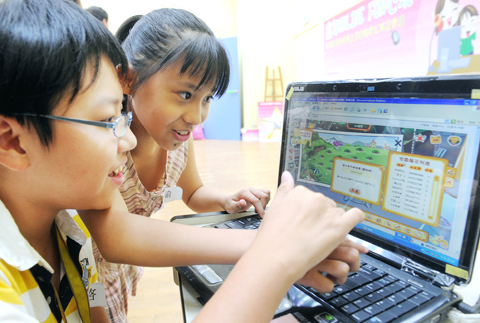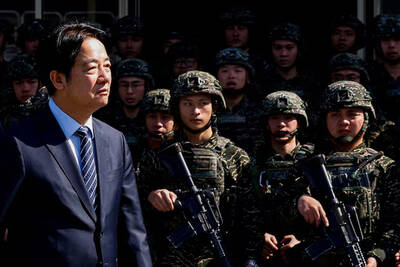Although a majority of children in the country spend a large portion of their free time playing online games, most parents are not satisfied with the current rating system to protect children from adult content, a survey conducted by the Child Welfare League Foundation suggested yesterday.
The foundation recently surveyed more than 1,000 parents with children under the age of 12 about their attitudes toward their children’s online gaming behavior. The survey showed that although most parents are worried about the problem of addiction to online games, as many as seven out of every 10 children spend most of their free time playing such games.
Over half (54 percent) of those surveyed said that they are not satisfied with the current rating system for online games and only about 27 percent indicated they had a clear understanding of the types of games their children play online.

PHOTO: CHIEN JUNG-FONG, TAIPEI TIMES
The survey also showed that four out of five parents believe there are not enough child-appropriate games on the market. As many as 70 percent of parents are worried about their children playing online games, their biggest concerns being that their children “spend too much time playing,” have access to “inappropriate content” and “make friends who exert a bad influence.”
Foundation executive director Alicia Wang (王育敏) said that many online games rated for a general audience are not child-friendly because they contain inappropriate content relating to sex, violence or gambling.
“Quality online games should have five important characteristics: They should be educational, contain age-appropriate content, provide playtime controls, facilitate parent-child interaction and allow game monitoring,” Wang said.
The director said quality games should allow children to benefit from playing games while also enabling parental control.
The foundation called on game developers to design games that are suitable for children, family friendly and nurture parent-child relationships, saying this problem is especially relevant during the summer vacation when children have more leisure time.

The Taipei Mass Rapid Transit (MRT) Wanda-Zhonghe Line is 81.7 percent complete, with public opening targeted for the end of 2027, New Taipei City Mayor Hou You-yi (侯友宜) said today. Surrounding roads are to be open to the public by the end of next year, Hou said during an inspection of construction progress. The 9.5km line, featuring nine underground stations and one depot, is expected to connect Chiang Kai-shek Memorial Hall Station to Chukuang Station in New Taipei City’s Jhonghe District (中和). All 18 tunnels for the line are complete, while the main structures of the stations and depot are mostly finished, he

The first global hotel Keys Selection by the Michelin Guide includes four hotels in Taiwan, Michelin announced yesterday. All four received the “Michelin One Key,” indicating guests are to experience a “very special stay” at any of the locations as the establishments are “a true gem with personality. Service always goes the extra mile, and the hotel provides much more than others in its price range.” Of the four hotels, three are located in Taipei and one in Taichung. In Taipei, the One Key accolades were awarded to the Capella Taipei, Kimpton Da An Taipei and Mandarin Oriental Taipei. Capella Taipei was described by

Minister of Economic Affairs Kung Ming-hsin (龔明鑫) yesterday said that private-sector refiners are willing to stop buying Russian naphtha should the EU ask them to, after a group of non-governmental organizations, including the Centre for Research on Energy and Clean Air (CREA), criticized the nation’s continued business with the country. While Taiwan joined the US and its Western allies in putting broad sanctions on Russia after it invaded Ukraine in 2022, it did not explicitly ban imports of naphtha, a major hard-currency earner for Russia. While state-owned firms stopped importing Russian oil in 2023, there is no restriction on private companies to

President William Lai (賴清德) is expected to announce a new advanced “all-domain” air defense system to better defend against China when he gives his keynote national day speech today, four sources familiar with the matter said. Taiwan is ramping up defense spending and modernizing its armed forces, but faces a China that has a far larger military and is adding its own advanced new weapons such as stealth fighter jets, aircraft carriers and a huge array of missiles. Lai is expected to announce the air defense system dubbed “Taiwan Dome” in his speech this morning, one of the sources said. The system